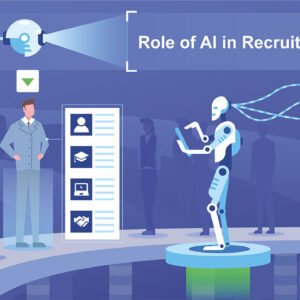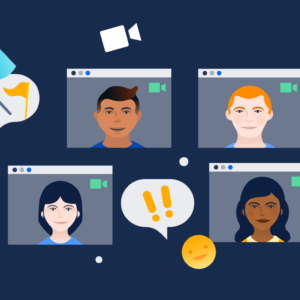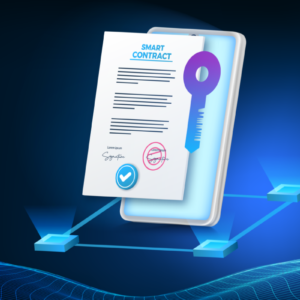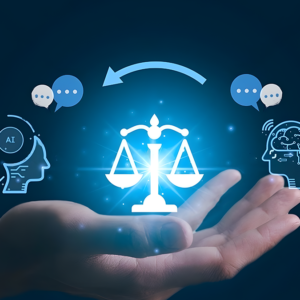In today’s fast-paced business environment, the role of AI in employee training is becoming increasingly important. Companies are turning to artificial intelligence training solutions to create customized training programs that cater to the unique needs and skills of each employee. This approach not only improves employee engagement and productivity but also helps to reduce training costs and enhance overall business performance. AI in Employee Training is revolutionizing the way companies approach employee development, making it more efficient and effective.
With the help of AI in Employee Training, companies can create personalized learning experiences that are tailored to the individual needs of each employee. This is made possible through artificial intelligence training solutions that use data and analytics to identify skill gaps and create customized training programs. By leveraging AI in Employee Training, companies can improve employee performance, increase job satisfaction, and reduce turnover rates.
Introduction to AI in Employee Training
As companies continue to adopt AI in Employee Training, it’s essential to understand the benefits and advantages of this approach. Artificial intelligence training solutions offer a range of benefits, including improved employee engagement, increased productivity, and reduced training costs. By investing in AI in Employee Training, companies can create a more efficient and effective training program that meets the unique needs of each employee.
Key Takeaways
- AI in Employee Training is becoming increasingly important in today’s business environment.
- Artificial intelligence training solutions can create customized training programs that cater to the unique needs and skills of each employee.
- AI in Employee Training can improve employee engagement, productivity, and job satisfaction.
- Artificial intelligence training solutions can reduce training costs and enhance overall business performance.
- AI in Employee Training offers a range of benefits, including improved employee performance and increased efficiency.
- Companies can leverage AI in Employee Training to create personalized learning experiences that meet the unique needs of each employee.
Understanding AI and Its Impact on the Workplace
Artificial intelligence (AI) is transforming the way businesses operate, and its impact on the workplace is significant. With the help of employee development AI technology, companies can now provide personalized training and development programs for their employees. This not only enhances the overall learning experience but also improves job satisfaction and productivity.
The use of machine learning for training programs is becoming increasingly popular, as it enables businesses to automate routine tasks and focus on more strategic initiatives. By leveraging AI-powered tools, companies can analyze employee data, identify skill gaps, and create customized learning paths to address these gaps.
- Improved accuracy and efficiency in training programs
- Enhanced decision-making capabilities through data-driven insights
- Personalized learning experiences tailored to individual employee needs
As AI continues to evolve, its applications in the workplace will expand, leading to new opportunities for growth and innovation. By embracing employee development AI technology and machine learning for training programs, businesses can stay ahead of the curve and achieve a competitive edge in the market.
“The future of work is about augmenting human capabilities, not replacing them. AI has the potential to enhance employee development and create a more skilled and productive workforce.” – Josh Bersin, Global Industry Analyst
| Benefits of AI in the Workplace | Description |
|---|---|
| Improved Efficiency | Automating routine tasks and streamlining processes |
| Enhanced Decision-Making | Providing data-driven insights for informed decision-making |
| Personalized Learning | Creating customized learning paths for individual employees |
The Importance of Personalized Training
Personalized training is a crucial aspect of employee development, as it enables companies to tailor their training programs to the unique needs and skills of each employee. This approach has been shown to lead to significant improvements in employee engagement, productivity, and job satisfaction. With the help of AI-powered learning platforms, companies can now provide workforce training with AI that is more effective and efficient.
Some key benefits of personalized training include higher completion rates, improved knowledge retention, and increased employee satisfaction. Employee feedback also plays a critical role in this process, as it allows companies to identify areas where employees need additional support and provide targeted training interventions. By leveraging AI-powered learning platforms, companies can create customized learning paths that cater to the individual needs of each employee, leading to better outcomes and increased job satisfaction.
Here are some statistics that support the importance of personalized training:
- 75% of employees prefer personalized learning experiences
- 60% of companies that use AI-powered learning platforms report improved employee engagement
- 50% of employees who receive personalized training report increased job satisfaction
By incorporating AI-powered learning platforms into their workforce training with AI, companies can create a more effective and efficient training program that meets the unique needs of each employee. This approach can lead to significant improvements in employee development, productivity, and job satisfaction, ultimately driving business success.
How AI Assists in Employee Onboarding
As companies continue to evolve and grow, the process of employee onboarding has become a critical component of their success. With the help of AI-driven employee education, organizations can streamline the onboarding process, making it more efficient and effective. Automated training tools for employees can help reduce the time and cost associated with onboarding, allowing new hires to get up and running quickly.
The use of AI in employee onboarding can be seen in several ways, including:
- Streamlining routine tasks, such as data entry and document processing, allowing HR teams to focus on more strategic activities
- Creating personalized onboarding experiences, providing new employees with relevant information and training tailored to their specific needs and roles
- Reducing the time and cost associated with onboarding, allowing companies to get new employees productive more quickly
By leveraging AI-driven employee education and automated training tools for employees, companies can improve the overall onboarding experience, leading to increased employee satisfaction and retention. As the workplace continues to evolve, it’s essential for organizations to stay ahead of the curve and embrace the benefits of AI in employee onboarding.
Customizing Learning Paths with AI
Artificial intelligence is revolutionizing the way companies approach employee training and development. By leveraging machine learning for training programs, organizations can create personalized learning paths that cater to the unique needs and skills of each employee. This approach enables employees to learn at their own pace, focusing on areas where they need improvement, and accelerating their professional growth.
The use of AI-enhanced training programs allows companies to analyze employee skill sets, identifying gaps and providing targeted interventions. This not only enhances employee performance but also increases job satisfaction and engagement. With AI-powered tools, companies can create adaptive learning experiences, adjusting the difficulty level and content of training programs based on employee performance and progress.
Some key benefits of customizing learning paths with AI include:
- Improved employee engagement and retention
- Enhanced skill development and knowledge acquisition
- Increased efficiency and reduced training time
- Personalized learning experiences that cater to individual needs
By incorporating machine learning algorithms into their training programs, companies can continuously assess and refine their approach, ensuring that employees receive the most effective and relevant training possible. This not only drives business success but also contributes to the growth and development of employees, making them more confident and competent in their roles.
| Benefits | Description |
|---|---|
| Personalized Learning | AI-enhanced training programs provide tailored learning experiences that cater to individual employee needs |
| Improved Efficiency | Machine learning algorithms streamline training processes, reducing time and increasing productivity |
| Enhanced Engagement | Customized learning paths increase employee engagement and motivation, leading to better job satisfaction and retention |
The Role of Data Analytics in Training
Data analytics plays a vital role in employee training, enabling companies to make informed decisions and drive personalized learning experiences. By leveraging artificial intelligence training solutions, organizations can collect and analyze relevant data on employee performance, learning behaviors, and training outcomes. This information provides valuable insights into the effectiveness of their training programs, allowing them to identify areas for improvement and optimize their strategies.
The integration of AI in Employee Training has revolutionized the way companies approach training and development. With the help of data analytics, organizations can create tailored training interventions, providing employees with targeted recommendations and adaptive learning experiences. This not only enhances employee engagement but also improves knowledge retention and overall job performance.
Key Benefits of Data Analytics in Training
- Improved training effectiveness through data-driven decision making
- Enhanced personalized learning experiences with AI in Employee Training
- Increased employee engagement and knowledge retention
- Optimized training strategies through data analysis and insights
By embracing data analytics and artificial intelligence training solutions, organizations can unlock the full potential of their training programs, driving business growth and success. As the use of AI in Employee Training continues to evolve, it’s essential for companies to stay ahead of the curve, leveraging the latest technologies and trends to create a competitive edge in the market.
Enhancing Engagement Through Gamification
Gamification is a powerful tool for enhancing employee engagement, providing a fun and interactive way to learn new skills and develop new behaviors. By incorporating AI-powered learning platforms into their training programs, companies can create more engaging and effective learning experiences. This approach can be particularly useful for workforce training with AI, as it allows employees to develop the skills they need to succeed in an increasingly automated workplace.
Some key benefits of gamification include increased motivation, improved knowledge retention, and enhanced collaboration. AI-powered gamification can take this to the next level by providing personalized recommendations, adaptive difficulty levels, and real-time feedback. For example, a company might use a point system to reward employees for completing training modules, with leaderboards to encourage friendly competition.
Successful Gamification Methods
- Point systems: reward employees for completing training modules or achieving certain milestones
- Badges: provide visual recognition of employees’ achievements and skills
- Leaderboards: encourage friendly competition and motivate employees to improve their performance
By incorporating these methods into their training programs, companies can create a more engaging and interactive learning experience. This can be particularly effective when combined with AI-powered learning platforms, which can provide personalized recommendations and adaptive difficulty levels to help employees develop the skills they need to succeed. With the right approach to gamification and workforce training with AI, companies can improve employee engagement, retention, and overall performance.
AI-Driven Content Curation
AI-driven employee education is revolutionizing the way companies approach training and development. With the help of automated training tools for employees, organizations can provide personalized learning experiences that cater to individual needs and interests. One key aspect of this is AI-driven content curation, which involves gathering and organizing relevant learning materials from various sources.
This process enables employees to access a wide range of learning resources, including online courses, articles, and videos, all in one place. AI-powered tools can analyze employee learning goals and preferences, providing personalized recommendations for content that is most relevant to their development. For instance, IBM uses AI-driven content curation to provide its employees with tailored learning paths, resulting in improved knowledge retention and job performance.
Benefits of AI-Driven Content Curation
- Personalized learning experiences
- Access to a wide range of learning resources
- Improved knowledge retention and job performance
- Enhanced employee engagement and satisfaction
Popular platforms for AI content curation include learning management systems, content aggregators, and AI-powered learning platforms. These platforms use machine learning algorithms to continuously update and refresh learning materials, ensuring that employees have access to the latest information and best practices. By leveraging AI-driven content curation, organizations can provide their employees with the training and development they need to succeed in today’s fast-paced business environment.
| Platform | Features |
|---|---|
| Learning Management System | Personalized learning paths, automated content curation, real-time analytics |
| Content Aggregator | Access to a wide range of learning resources, AI-powered content recommendations, social learning features |
| AI-Powered Learning Platform | AI-driven content curation, adaptive learning experiences, real-time feedback and assessment |
The Future of AI in Employee Training
As we look to the future, it’s clear that AI in Employee Training will continue to play a vital role in shaping the way we learn and develop new skills. With the rapid evolution of artificial intelligence training solutions, companies are now able to provide more personalized and effective training programs for their employees. One of the key trends to watch in AI technology is the use of natural language processing, which enables machines to understand and respond to human language.
This technology has the potential to revolutionize the way we interact with AI-powered learning platforms, making them more intuitive and user-friendly. Predictive analytics is another area that holds great promise, as it allows companies to forecast employee learning needs and tailor their training programs accordingly. By leveraging these advancements in AI technology, businesses can create more engaging and effective training experiences that drive real results.
Trends to Watch in AI Technology
- Natural language processing
- Computer vision
- Predictive analytics
As we move forward, it’s essential for companies to stay up-to-date with the latest developments in AI technology and be prepared to adapt and evolve their training strategies accordingly. By doing so, they can unlock the full potential of AI in Employee Training and stay ahead of the curve in today’s fast-paced business landscape. With the right artificial intelligence training solutions in place, companies can empower their employees to succeed and drive long-term growth and success.
Addressing Common Concerns About AI
As companies increasingly adopt AI-powered learning platforms for workforce training with AI, concerns about the impact of AI on jobs, employee data, and ethical practices arise. It’s essential to address these concerns to ensure a smooth transition to AI-driven training programs.
The primary concern is job displacement, but AI is also creating new job opportunities and enhancing existing ones. For instance, AI can help automate routine tasks, freeing up time for more strategic and creative work. To mitigate job displacement, companies can invest in retraining and upskilling programs that focus on emerging technologies like AI.
Key Considerations for AI Adoption
- Implementing secure and transparent data storage and processing practices to address privacy concerns
- Ensuring ethical AI practices by prioritizing transparency, accountability, and fairness in AI-powered training programs
- Continuously monitoring and evaluating the impact of AI on the workforce to make data-driven decisions
By addressing these concerns and considering the benefits of AI-powered learning platforms for workforce training with AI, companies can create a more efficient, effective, and ethical training program that supports the growth and development of their employees.
Case Studies: Successful AI Implementation
Several notable companies have successfully implemented AI in their employee training programs, achieving significant improvements in employee engagement, productivity, and job satisfaction. This is largely due to the effectiveness of AI-driven employee education and automated training tools for employees, which provide personalized learning experiences and streamline training processes.
Companies such as IBM, Microsoft, and Accenture have seen remarkable results from their AI-powered training initiatives. For instance, IBM’s AI-driven training program has led to a 30% increase in employee engagement and a 25% reduction in training time. Similarly, Microsoft’s automated training tools for employees have resulted in a 40% increase in knowledge retention and a 20% increase in employee satisfaction.
- Improved employee engagement and productivity
- Increased knowledge retention and job satisfaction
- Reduced training time and costs
These case studies demonstrate the potential of AI in transforming employee training and development. By leveraging AI-driven employee education and automated training tools for employees, companies can create more effective and efficient training programs that meet the unique needs of their employees.
Steps to Implement AI in Your Training Programs
Integrating AI in employee training programs is a strategic step that can revolutionize the way your organization approaches skill development. The key is to begin by assessing your specific needs and goals. What challenges are you facing in your current training initiatives? Where can artificial intelligence training solutions provide the greatest impact?
Once you’ve identified the areas ripe for improvement, it’s time to carefully select the right AI-enhanced training programs and tools. Look for solutions that seamlessly integrate with your existing systems and processes, ensuring a smooth transition. Continuous evaluation and refinement are essential, as AI-powered training requires ongoing monitoring and optimization to maintain its effectiveness.
By following this systematic approach, your organization can unlock the full potential of AI in employee training. Embrace this transformative technology and empower your workforce to reach new heights of proficiency and engagement. The future of learning is here, and it’s powered by the intelligence of AI.














